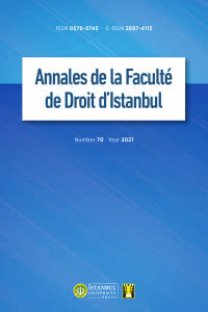Facebook Decision of the Berlin District Court: Does the use of Unfair Terms Constitute Unfair Competition?
Anahtar Kelimeler:
Consumer Protection, Holistic Approach, Unfair Terms, Unfair Competition, Terms of Use
Facebook Decision of the Berlin District Court: Does the use of Unfair Terms Constitute Unfair Competition?
Unfair terms regulation is aimed at protecting consumers from differences in negotiation power and information asymmetry between the consumer and the entrepreneur. However, the unfair terms regulations serve not only for the protection of consumers but also the protection of competition between entrepreneurs so as to prevent unfair competition. Hence, based on the regulation the use of terms contrary to the rule of good faith may constitute unfair competition (TCC Art.55/1/f.). Nevertheless, the legal consequences of unfair terms and unfair competition regulations are different. This study analyses the effect of the use of unfair terms on the claims based on unfair competition. The decision of the Berlin District Court on 16 January 2018 regarding Facebook’s terms of use has been selected as a reference to answer to the question . Thereby, the interaction of different protection mechanisms is demonstrated. The decision is analysed not in terms of data protection law, but in terms of the assessments regarding whether the use of unfair terms constitutes unfair competition. The court assessed the terms of use for conformity with the provisions of BGB §§305-310 and decided whether the provision of services based on terms of use containing unfair terms constitutes unfair competition. This case, filed by a consumer organisation to protect the interests of consumers, has been chosen deliberately. It is aimed at emphasising the significance of the collective action in consumer protection. Evaluating the protection mechanisms as a holistic approach will ensure a more effective protection of both the consumer and competition.
___
- Antalya OG and Doğancı ED, “Genel İşlem Koşullarında Saydamlık Kuralının, Bunun TBK m. 20 vd.’daki Görünümlerinin ve TTK m. 55 f. 1 f ile TBK m. 20 vd.’nın Birlikte Uygulanabilirliğinin Değerlendirilmesi”, 2018 24(2) Marmara Üniversitesi Hukuk Fakültesi Dergisi 823-860.
- Atamer Y, Sözleşme Özgürlüğünün Sınırlandırılması Sorunu Çerçevesinde Genel İşlem Şartlarının Denetlenmesi, (2. Bası, Beta 2001).
- Aydın R, “Tüketici Sözleşmelerindeki Haksız Şartlar (TKHK m. 5)”, 2016 11(1) Erciyes Üniversitesi Hukuk Fakültesi Dergisi 83-123.
- Baş E, “6098 Sayılı Türk Borçlar Kanunu’nda Genel İşlem Koşulu Kavramı ve İçerik Denetimi”,
- Prof. Dr. Mustafa Dural’a Armağan, (Filiz 2013) 276-306.
- Beck Online (https://beck-online.beck.de/Home)
- LG Berlin (Zivilkammer 16), Urteil vom 16.01.2018-16 O 341/15, BeckRS 2018, 1060, Beck- Online-10.08.2022 (“Facebook”).
- Axel Metzger, “Verbraucherschutz bei der Bereitstellung digitaler Produkte Zur Durchsetzung der §§ 327–327u BGB”, in Antje G. I. Tölle, Jörg Benedict, Harald Koch, Stephan Klawitter, Christoph G. Paulus, Friedrich Preetz (eds.) Selbstbestimmung: Freiheit und Grenzen-Festschrift für Reinhard Singer zum 70. Geburtstag, (Berliner Wissenschafts-Verlag 2021) 431-443.
- Statista GmbH, “Ranking der größten Social Networks und Messenger nach der Anzahl der Nutzer im Januar 2022”, Date of Access 08 November 2022.
- Stoffels M, AGB-Rechts (4. Auflage, C.H. Beck 2021).
- https://eur-lex.europa.eu/legal-content/EN/TXT/PDF/?uri=CELEX:32020L1828&from=EN Date of Access 08 December 2022.
- https://www.tessian.com/blog/biggest-gdpr-fines-2020/ , Date of Access 08 November 2022.
- ISSN: 0578-9745
- Yayın Aralığı: Yılda 2 Sayı
- Başlangıç: 1951
- Yayıncı: İstanbul Üniversitesi
Sayıdaki Diğer Makaleler
Türk Mahkemeleri Yabancı Ortak Velayet Kararlarını Tenfiz Etmeye Başladı Mı?
Roxane DE MASSOL DE REBETZ, Pınar ÖLÇER
Fundamental Rights and Freedoms of Citizen-Employee in Labour Law
Ali GÜZEL, Deniz UGAN ÇATALKAYA, Hande HEPER
Contractual Performance Facing Covid-19: A Comparative Analysis
The 1921 Constitution and Beyond: Any Inspiration After 100 Years?
